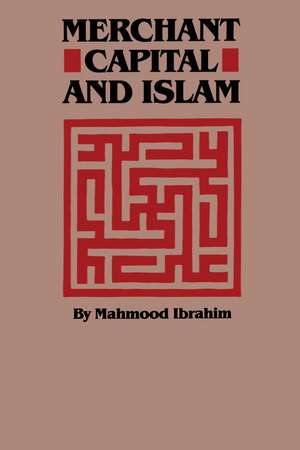Merchant Capital and Islam
Autor Mahmood Ibrahimen Limba Engleză Paperback – aug 1990
He argues that Islam contributed certain institutional beliefs and practices that unblocked obstacles and helped merchants gain political and economic hegemony over western Asia. Ibrahim contends that, with the conquest of Mecca, the newly formed Muslim state spread its control to the rest of Arabia, which mobilized a significant social force and allowed for further expansion outside Arabia, thus extending merchant control to include new surplus-producing regions, a vast network of trade routes, and wider markets.
This extensively researched study offers a new interpretation of the history of Islam, including the formation of Islamic society and the unfolding of the first civil war. In offering a better understanding of the Umayyad Caliphate that ruled Islam for a century to come, Ibrahim helps lay the groundwork for understanding the Middle East as it is today.
Of interest to scholars of Middle Eastern studies, this important work will be necessary reading for students of Near Eastern and North African history, as well as students of the history of Medieval Europe.
Preț: 200.64 lei
Nou
Puncte Express: 301
Preț estimativ în valută:
38.39€ • 39.61$ • 32.04£
38.39€ • 39.61$ • 32.04£
Carte tipărită la comandă
Livrare economică 26 martie-09 aprilie
Preluare comenzi: 021 569.72.76
Specificații
ISBN-13: 9780292741188
ISBN-10: 0292741189
Pagini: 256
Dimensiuni: 152 x 229 x 20 mm
Greutate: 0.38 kg
Editura: University of Texas Press
Colecția University of Texas Press
ISBN-10: 0292741189
Pagini: 256
Dimensiuni: 152 x 229 x 20 mm
Greutate: 0.38 kg
Editura: University of Texas Press
Colecția University of Texas Press
Notă biografică
Mahmood Ibrahim is Professor and Chair of History at California State Polytechnic University, Pomona.
Cuprins
- Acknowledgments
- Introduction
- 1. Pre-Islamic Arabia
- The Period of Antiquity (to A.D. 300)
- The Second Himyarite State (A.D. 300–600)
- The Decline of Himyar
- The Lakhmids of Hira
- 2. The Development of Merchant Capital in Mecca
- The Genesis
- The Development
- The Rise of Mecca’s Power
- Culture as Ideology
- 3. Merchant Capital and Mecca’s Internal Development
- Social and Economic Differentiation
- Factional Conflict and the Rise of the Banu Umayya
- Consolidation of the Position of the Banu Umayya
- 4. Merchant Capital and the Rise of Islam
- The Institutional Environment of Islam
- Muhammad in Mecca
- Muhammad in Medina
- The Winning of Mecca and Arabia
- 5. Islamic Expansion and the Establishment of the Islamic State
- The Consolidation of Arabia: The Ridda War
- Syria
- Iraq
- Egypt
- 6. The Emergence of the New Segment
- Distribution of Wealth
- The Shura and the Seeds of the Fitna
- ʿUthman’s Caliphate
- Growth of the Opposition
- Open Revolt
- 7. The Civil War and the Struggle for Power
- The Election of ʿAli
- The Revolt of Talha and Zubair
- Muʿawiya’s Strategy
- Siffin
- The Tahkim
- The Internal Conquest: The Return of the Traditional Segment
- Epilogue
- The Umayyad Caliphate
- Islam, Capitalism, or Feudalism
- Notes
- Bibliography
- Index
Descriere
Through a rereading of original Arabic sources and drawing from modern scholarship on the subject, Ibrahim offers a new interpretation of the rise of Islam.
















